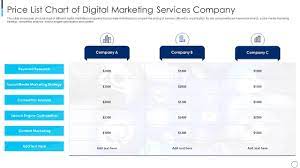The Real Costs of Digital Marketing
In today’s digital age, businesses are increasingly turning to digital marketing to reach their target audience and drive growth. While digital marketing offers a cost-effective way to connect with customers, it’s essential for businesses to understand the real costs involved in running successful campaigns.
Advertising Costs
One of the primary costs of digital marketing is advertising. Whether you’re running pay-per-click (PPC) ads, social media ads, or display ads, you’ll need to set aside a budget for ad spend. The cost of advertising can vary depending on factors such as the platform you’re using, your target audience, and the competitiveness of your industry.
Content Creation Costs
Creating high-quality content is crucial for engaging your audience and driving traffic to your website. From blog posts and videos to social media posts and infographics, producing compelling content requires time and resources. Businesses may need to invest in hiring content creators or outsourcing content production to meet their marketing goals.
Tools and Software Costs
To streamline your digital marketing efforts and track performance metrics effectively, you’ll need access to various tools and software solutions. These may include email marketing platforms, analytics tools, social media management software, and SEO tools. Investing in the right tools can help optimize your campaigns and improve ROI.
Website Maintenance Costs
Your website is often the first point of contact for potential customers, so it’s essential to keep it updated and optimized for user experience. Website maintenance costs may include hosting fees, domain registration fees, security updates, design changes, and ongoing technical support.
Agency Fees or In-House Team Costs
Depending on your resources and expertise, you may choose to work with a digital marketing agency or build an in-house team to manage your campaigns. Agency fees or employee salaries can contribute significantly to your overall digital marketing costs but can also provide valuable expertise and support.
In Conclusion
While digital marketing offers numerous benefits for businesses looking to expand their online presence, it’s important to consider the various costs involved in running effective campaigns. By understanding these costs upfront and allocating resources strategically, businesses can maximize their ROI and achieve long-term success in the competitive digital landscape.
5 Essential Tips to Manage and Optimize Your Digital Marketing Costs
- Set a clear budget for your digital marketing campaigns to avoid overspending.
- Monitor the performance of your campaigns regularly to assess cost-effectiveness.
- Consider investing in cost-effective channels like email marketing or SEO for long-term results.
- Use analytics tools to track ROI and adjust spending based on what works best for your business.
- Negotiate with vendors or agencies to get the best rates and maximize your budget.
Set a clear budget for your digital marketing campaigns to avoid overspending.
Setting a clear budget for your digital marketing campaigns is essential to avoid overspending and ensure that your resources are allocated effectively. By establishing a specific budget upfront, you can better plan and prioritize your marketing activities, making informed decisions on where to invest your funds for maximum impact. Monitoring and adjusting your budget as needed throughout the campaign will help you stay on track and optimize your spending to achieve your desired outcomes efficiently.
Monitor the performance of your campaigns regularly to assess cost-effectiveness.
Monitoring the performance of your digital marketing campaigns regularly is essential to assess their cost-effectiveness. By analyzing key metrics such as conversion rates, click-through rates, and return on investment (ROI), you can gain valuable insights into which strategies are delivering the best results. This data-driven approach allows you to optimize your campaigns in real-time, allocate budget more effectively, and make informed decisions to maximize the impact of your digital marketing efforts. Regular monitoring ensures that you stay on track with your goals and continuously improve the efficiency and effectiveness of your campaigns.
Consider investing in cost-effective channels like email marketing or SEO for long-term results.
When managing digital marketing costs, it is advisable to consider investing in cost-effective channels such as email marketing or SEO for long-term results. By allocating resources towards these channels, businesses can establish a strong online presence, engage with their target audience effectively, and drive sustainable growth over time. Email marketing allows for personalized communication with customers, while SEO helps improve organic search visibility and drive website traffic. These strategies may require initial investment but can yield significant returns in the form of increased brand awareness, customer loyalty, and lead generation in the long run.
Use analytics tools to track ROI and adjust spending based on what works best for your business.
Utilizing analytics tools to monitor Return on Investment (ROI) in digital marketing is crucial for optimizing spending and maximizing results. By analyzing data on campaign performance, businesses can identify which strategies are most effective in reaching their target audience and driving conversions. This data-driven approach allows businesses to make informed decisions on where to allocate resources, ensuring that marketing efforts are focused on tactics that yield the highest returns. Adjusting spending based on analytics insights enables businesses to continuously refine their digital marketing strategies, ultimately leading to improved ROI and long-term success in the competitive online landscape.
Negotiate with vendors or agencies to get the best rates and maximize your budget.
When it comes to managing digital marketing costs, a valuable tip is to negotiate with vendors or agencies to secure the best rates and optimize your budget effectively. By engaging in open discussions and exploring potential discounts or package deals, businesses can leverage their negotiating power to get more value for their investment. Building strong relationships with vendors or agencies can lead to long-term cost savings and enhanced campaign performance, ultimately helping businesses achieve their marketing goals efficiently.




